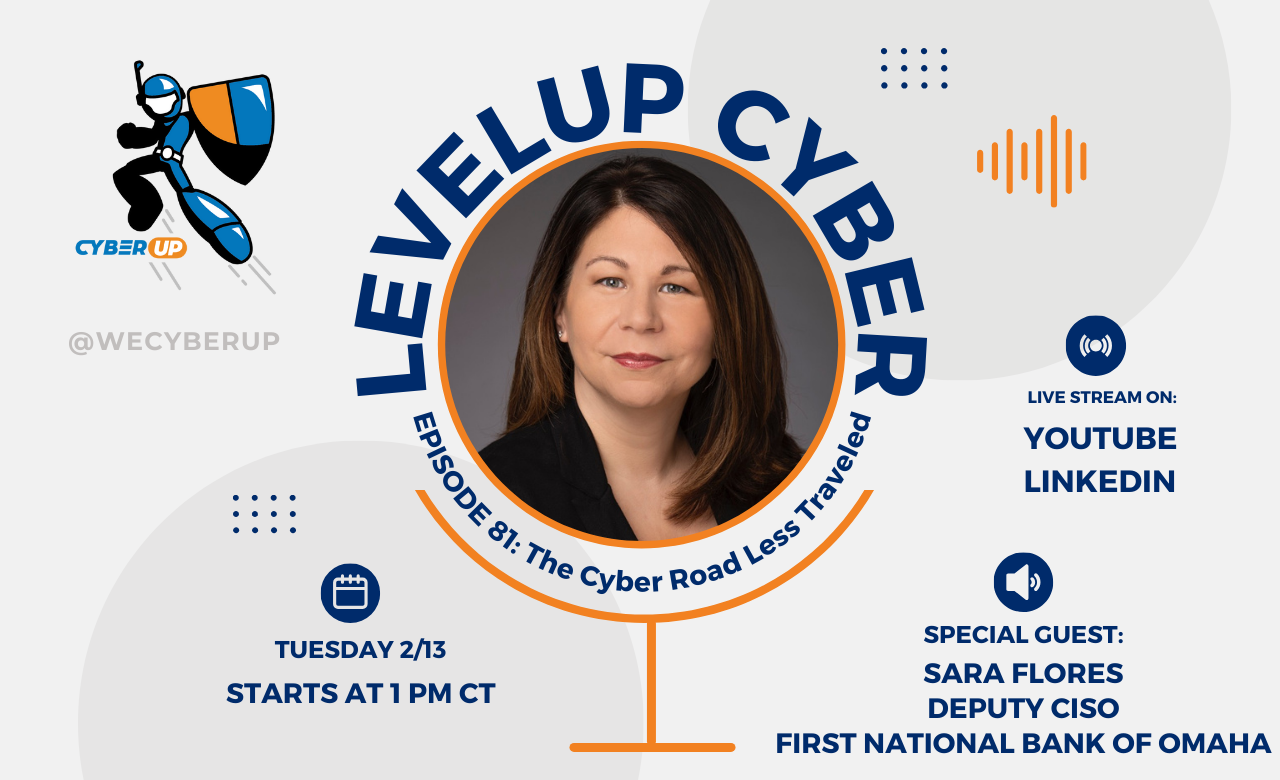
Cy Says Blog & Podcast
Posts about:
cybersecurity (5)

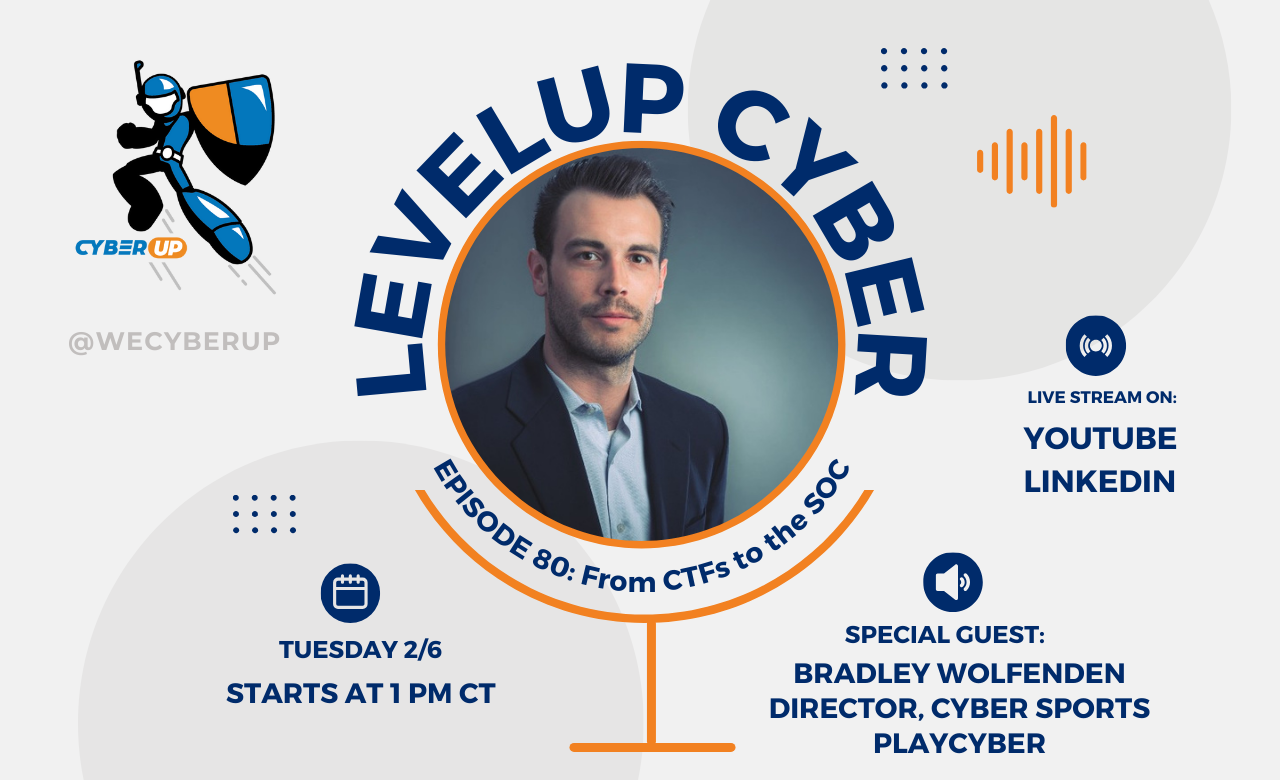
Ep 80: LevelUp Cyber w/Brad Wolfenden - From CTFs to the SOC

The Future of Hiring: How Skills-Based Hiring is Shaping the Workplace
Finding top talent is hard especially when your team is already stretched thin. You need to find a person who can hit the ground running, but how? Gone are the days of solely judging candidates based on their degrees and experience. Skills-based hiring is revolutionizing the hiring process.
Skills-based hiring prioritizes skill sets over formal education and experience. While traditional hiring often relies heavily on educational background and work history, skills-based hiring flips the script. Employers now recognize that as long as candidates possess the necessary skills, their lack of formal education or relevant job experience shouldn't disqualify them. For instance, self-taught coders may lack a degree or prior coding job but possess the skills needed for the role. This approach focuses on inclusivity, welcoming candidates based on their abilities rather than excluding them due to specific prerequisites. However, it's crucial to verify candidates' skills through assessments or assignments rather than solely relying on their claims. This ensures candidates' skill levels align with the job requirements.
Skills-based hiring is starting to rise in popularity. Traditionally, recruiters would sift through countless resumes, looking for specific qualifications and experience. While these criteria are important, they don't always give a complete picture of a candidate's potential. Skills-based hiring is a more inclusive approach that emphasizes the actual skills an individual possesses, rather than just their credentials.
Now, you might be wondering why skills-based hiring matters. It comes with a multitude of advantages. It promotes diversity and inclusion in the workplace. By shifting the focus from degrees to skills, recruiters can give equal opportunities to a wider range of candidates. This not only helps to break traditional biases and stereotypes but also creates a more dynamic and innovative work environment.
Another perk of skills-based hiring is the efficiency it brings to the hiring process. Instead of spending hours sifting through resumes, recruiters can quickly identify the core skills and competencies required for a specific role. This streamlined approach saves time, energy, and resources for both employers and job seekers.
What's more, skills-based hiring can have a positive impact on employee engagement and satisfaction. When individuals are hired based on their skills, they have the opportunity to excel in their areas of expertise. This boosts confidence, job satisfaction, and overall performance, leading to happier employees and a more productive workforce.
So, how can organizations implement skills-based hiring successfully? Well, it starts with identifying the key skills and competencies needed for each role. By clearly defining what skills are required, employers can target their recruitment efforts and attract candidates who possess those specific abilities.
Of course, no transition is without its challenges. One of the main hurdles when adopting skills-based hiring is resistance to change. Many organizations have been following traditional hiring practices for years, and convincing them to shift their mindset may take some effort. It's important to educate stakeholders about the benefits of this approach and showcase success stories from other companies that have embraced skills-based hiring.
Addressing potential skills gaps and the need for ongoing training and development is yet another factor to keep in mind. While skills-based hiring allows organizations to focus on relevant skills, it's important to have strategies in place to bridge any gaps and provide opportunities for employees to continuously upgrade their skills.
Looking ahead, the future of skills-based hiring is promising. As technology advances, we can expect to see more sophisticated skill assessment tools emerging. These tools will provide even more accurate insights into candidates' capabilities, helping organizations make even better hiring decisions.
Skills-based hiring is revolutionizing the recruitment landscape, bringing a host of benefits to both employers and job seekers. By focusing on skills rather than solely relying on degrees and experience, organizations can create a more inclusive, efficient, and engaged workforce. Whether you're a job seeker or an employer, it's time to embrace skills-based hiring and unlock the true potential of talent.

Understanding Cybersecurity Basics: A Guide for K-12 Students
In today's digital age, where technology is all around us, it's essential to understand the basics of cybersecurity. Whether you're watching cat videos on YouTube, connecting with friends on social media, or doing research for school projects, it's crucial to know how to keep our kids safe online. So, let's dive in and explore the world of cybersecurity together!
But first, what exactly is cybersecurity? Well, it's like a virtual shield that protects you from online threats. Just as you lock your front door to keep intruders out, cybersecurity helps you safeguard your personal information and keep hackers at bay.
Now, you might be wondering, "Why is cybersecurity important for me?" In today's interconnected world, cyber threats are constantly evolving. Cybercriminals may try to steal your personal information, like passwords or credit card details, through various tricks. That's why it's essential to understand common cyber threats, like malware, phishing, social engineering, and password attacks.
So, how can you protect your personal information online? Let's find out!
First and foremost, let's talk about passwords. We know, remembering multiple passwords can be tough. But it's important to use strong and unique passwords for all your accounts. Avoid common words or personal information in your passwords and consider using a trusted password manager to make your life easier.
Another great way to secure your accounts is by enabling two-factor authentication. It's like having a secret code on top of your password. So even if someone manages to get hold of your password, they won't be able to access your accounts without the code generated on your smartphone or email.
Speaking of personal information, it's crucial to keep it safe. Be careful about sharing personal details like your address or phone number online, especially in public forums or on social media. And remember, if a stranger on the internet asks for your personal information, it's a big red flag! Always trust your instincts and avoid sharing sensitive information.
Social media is an amazing way to connect with friends and share cool stuff, but it can also have its risks. Set your privacy settings wisely to control who can see your posts and information. Also, never accept friend requests from people you don't know in real life and if something seems suspicious or too good to be true, it's best to steer clear of it.
Unfortunately, cyberbullying is a sad reality in today's digital world. If you ever experience cyberbullying, don't keep it to yourself. Reach out to a trusted adult, like a parent or teacher, who can provide guidance and support. Remember, you're never alone, and there are people who care about your well-being.
Now, let's talk about general internet safety. When browsing the web, be cautious of suspicious websites. Stick to trusted sources for information and double-check facts before accepting them as true. It's essential to build your critical thinking skills and be aware of fake news.
When it comes to online communication, use email wisely. Be cautious about opening emails from unknown senders, especially if they contain suspicious attachments or ask for personal information. Always double-check the email address to ensure it's legitimate. And hey, never click on links from unknown sources. Hover over the link to see the actual web address it will take you to before clicking on it.
Keeping your devices secure is also crucial. Make sure to update your computer, smartphone, or tablet regularly. These updates often include security patches that fix vulnerabilities hackers can exploit. Additionally, consider using reputable antivirus software to protect your devices from malware and other digital nasties.
Oh, and let's not forget about rogue applications and stick to official app stores when downloading apps. Read reviews and check the developer's information before clicking that download button and always think twice before granting permissions to an app, especially if it wants access to your contacts, camera, or microphone.
To protect your devices from theft or loss, create a strong password or PIN to lock your device. And if your device supports it, enable remote tracking or wiping features. This way, if you misplace your device or someone steals it, you can locate or erase its contents remotely.
Now, let's talk about online gaming! It's a fun way to connect with friends and explore virtual worlds. But remember, not everyone online has good intentions. Protect your personal information while gaming by using usernames instead of your real name. Avoid sharing personal details or your location with other players. And if you encounter inappropriate behavior, report it to the game's moderation or support team.
Lastly, let's touch on cybersecurity etiquette. As responsible digital citizens, it's important to respect others' privacy online. Understand the terms of service when using websites or apps, and only accept agreements you truly understand. Treat others online as you would in real life, with kindness and respect. And always think before you post or share something, considering how it might impact others.
In conclusion, understanding cybersecurity basics is crucial in today's digital world. By following these simple practices, you can protect yourself online and navigate the digital landscape safely. Remember, cybersecurity is a continuous learning journey, so stay updated and share your knowledge with others. Together, we can create a safer online environment for everyone. Keep exploring, stay curious, and be cyber savvy!
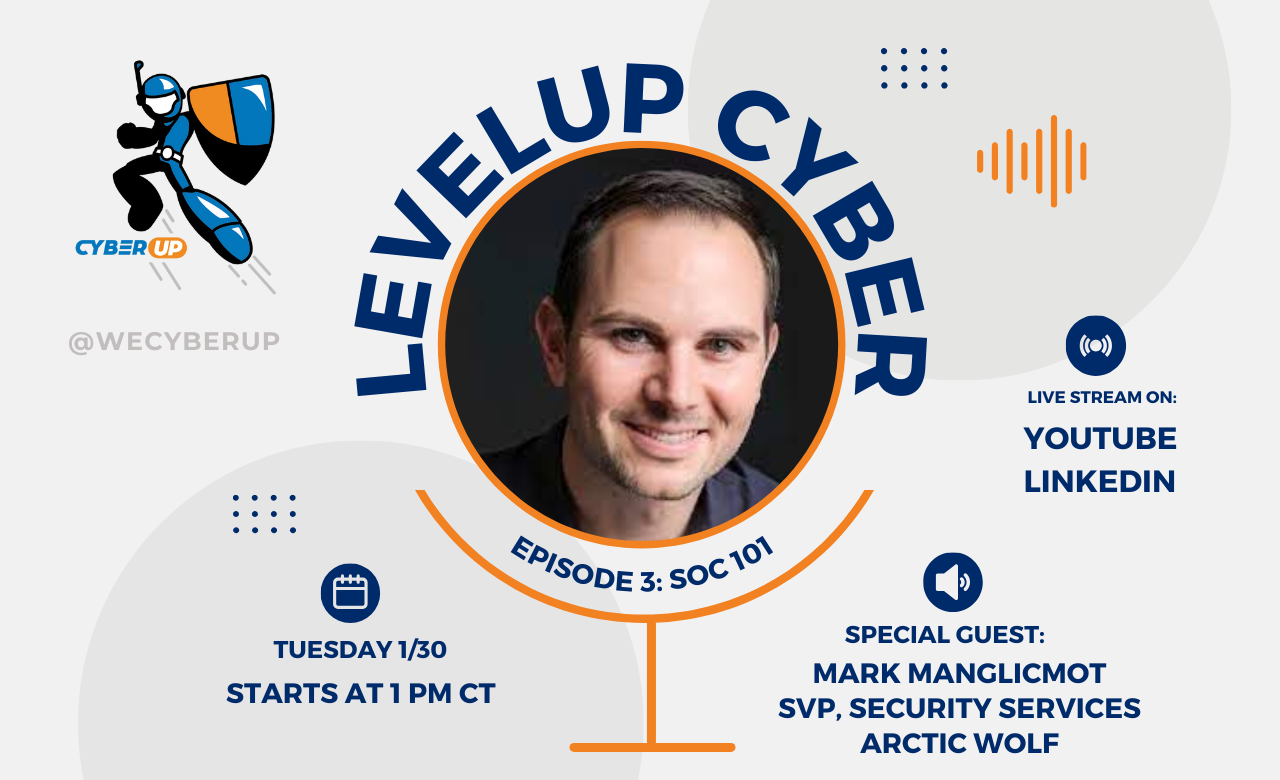
Ep 3-24: LevelUp Cyber w/Mark Manglicmot - SOC 101
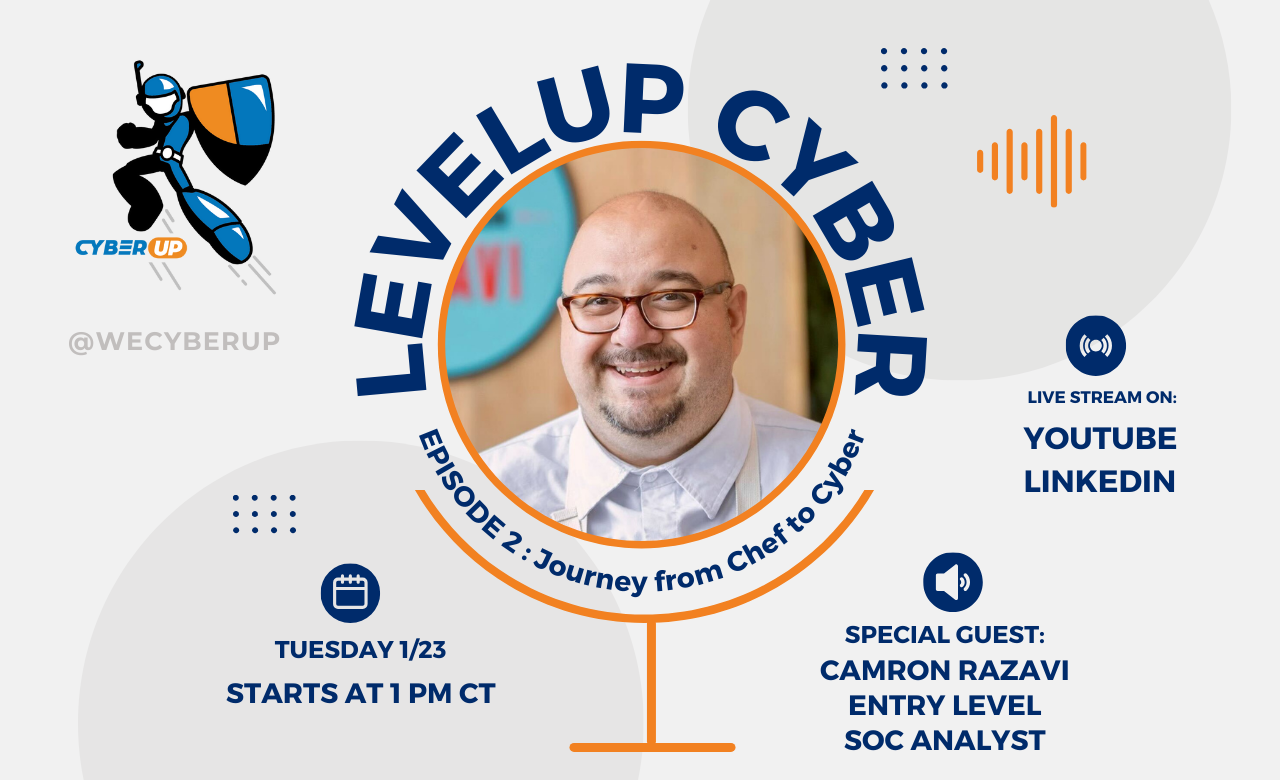
Ep 2-24: LevelUp Cyber w/Camron Razavi - From Chef to Cybersecurity
.png)
Ep 1 - 2024: LevelUp Cyber w/Tony Bryan - CyberUp in 2024 & Beyond
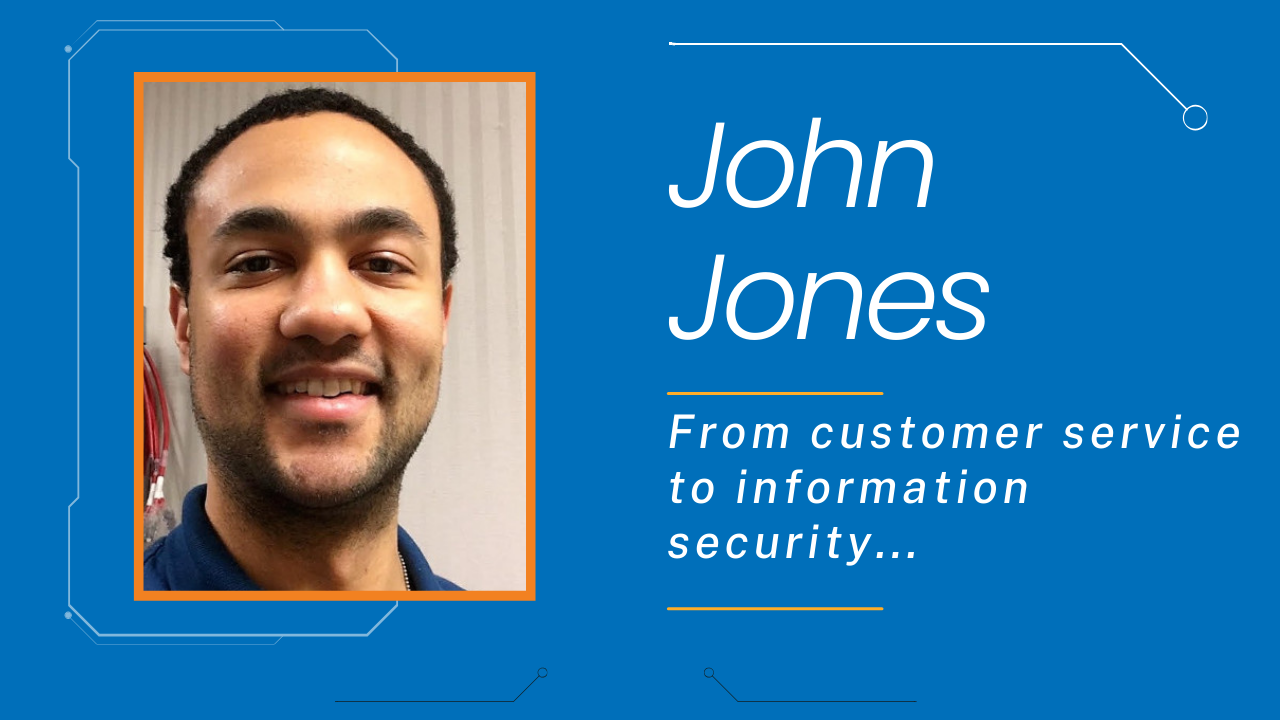
Apprentice Success Story: John Jones
In the ever-evolving landscape of cybersecurity, John Jones found himself facing a difficult challenge - the transition into the cybersecurity career field without experience. His background consisted of experience in IT Operational Support, Customer Service, and project experience in a healthcare infrastructure. However, his journey took a turn when he discovered CyberUp, an ally that helped him break through the barriers and also provided a structured path to success.
John is an aspiring cybersecurity professional who struggled with the initial difficulty of entering the cybersecurity field, hindered by a lack of experience. This common stumbling block for many aspiring cybersecurity professionals became the drive for finding a program that could bridge the gap and open doors to organizations willing to invest in training new talent.
The turning point for John was CyberUp, a program that served as more than just a stepping stone; it was a catalyst for his growth. CyberUp not only connected him with First Bank, an organization ready to nurture and develop new talent but also provided a structured framework that became instrumental in maintaining focus and setting goals in his cybersecurity career.
As an Information Security Analyst with First Bank, John's favorite project involves testing Insider Threat Management tools. This not only showcases his technical ability but also highlights his creative thinking in enhancing the effectiveness of security measures. Beyond the apprenticeship program, John is focused on furthering his education and professional development. His goals include studying for certifications, exploring different product suites, diving into networking topics, and gaining insights into lean Six Sigma.
One of the persistent challenges in cybersecurity that John noticed is that effective communication is important, especially to those without a technical background. John recognizes this challenge and emphasizes the need to convey the 'why' behind security policies in a way that resonates with non-technical individuals. This skill, he believes, is crucial in making cybersecurity principles understandable and actionable.
While John doesn't have a favorite quote or affirmation, his philosophy in cybersecurity revolves around patience with the learning curve and being humble. John acknowledges that the field is vast and ever-changing, and embracing the constant learning process is key to success. John also advises prospective CyberUp candidates, emphasizing the importance of honing written and verbal communication skills. In cybersecurity, clear articulation of technical concepts is as vital as the technical knowledge itself.
John's apprenticeship experience instilled confidence in his new career and gave him a sense of direction. The collaborative learning environment with fellow apprentices stood out to him as the best part of the experience. The camaraderie and shared growth within the program created a community for John that fueled motivation and mutual support.

Apprentice Success Story: Charles Long
Charles Long Jr. is a determined lifelong learner who wanted more in life. Charles started as a Janitor at a local casino however, he knew he wanted more for himself and his family and that is when he decided to pursue a new career in cybersecurity. With some assistance from CyberUp, he dove into the challenge and proved his determination. That's when his adventure with CyberUp kicked off, providing him not just with a roadmap but also with a boost of confidence throughout his apprenticeship program.
According to Charles, CyberUp wasn't just about learning technical skills – it played a crucial role in building up his self-confidence. In the world of cybersecurity, confidence is your secret weapon. For Charles, "Details Matter" is not just a saying – it's a way of life in the cybersecurity realm. It's about that meticulous mindset, the precision, and the undivided attention to detail that makes all the difference.
Of course, Charles didn't skate through his journey without facing challenges. Self-confidence was a bit of a struggle, and visualizing himself in a cybersecurity role was an uncomfortable feeling for him due to his lack of confidence. He constantly questioned himself and wondered if he could even do the job and do it well. But with CyberUp’s assistance offering constant support and assurance, Charles conquered those fears and came out on top.
So, what's the value Charles got from CyberUp? In his own words, "a career." It’s not just about learning the ropes; it's about CyberUp opening doors to a fulfilling career in the ever-evolving field of cybersecurity. Charles reflects on some of his favorite projects during his apprenticeship with Object Computing. He found joy in working on audits, getting that ISO certification stamp, and diving into various Governance, Risk, and Compliance (GRC) initiatives. As an Associate IT Engineer, he's not just contributing; he's jumpstarting security programs and playing a key role in his company's success.
Moving forward, Charles has his eyes set on continuous learning and hints at potential roles like a forensic analyst or a cybersecurity pro testifying in court. Despite some initial hesitation, Charles is all in for becoming a mentor and contributing to CyberUp's youth program, PowerUp. Public speaking might not be his forte, but his willingness to volunteer and share his experiences shows a genuine commitment to giving back and helping others find their way in the world of cybersecurity.
In a nutshell, Charles Long's journey is more than a success story – it's an inspiration for anyone eyeing a career in cybersecurity. From janitor to Associate IT Engineer, his story is a testament to the transformative power of determination, continuous learning, and a bit of mentorship.
As CyberUp continues to empower individuals like Charles, it's not just changing lives; it's reshaping the entire landscape of cybersecurity.

